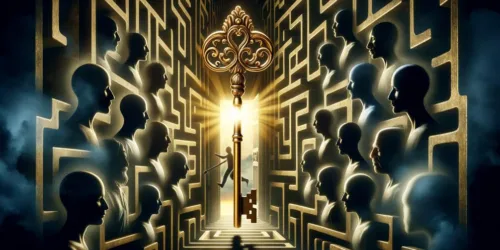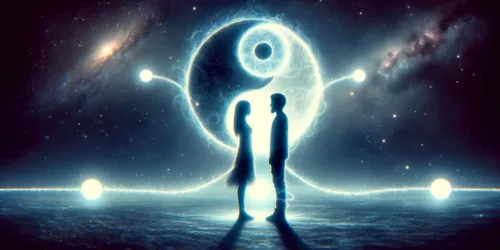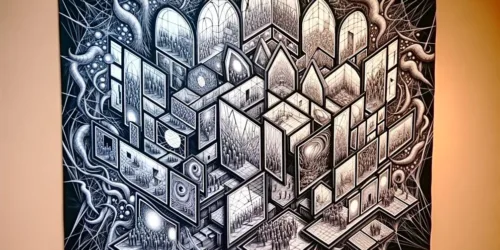Mind-Bending Films That Reveal the Secrets of Dissociative Identity Disorder
Have you ever considered how closely cinema can reflect the intricacies of a misunderstood mental condition like Dissociative Identity Disorder? You find yourself drawn into a cinematic world where characters navigate life with multiple identities, each fighting for control, each with a story to tell.
These films are more than mere entertainment; they're a bridge to understanding the complexities of DID, often shrouded in mystery and misconceptions. As you journey through the fragmented psyches portrayed in films like Fight Club and Split, you gain insights into the struggles and the humanity of those living with this disorder.
But remember, while these stories enlighten, they also raise questions about the portrayal of mental health in media. So, as you prepare to explore these narratives, ask yourself: where does the line between representation and reality blur?
Join this discussion to uncover the layers of truth and fiction in the depiction of DID on the silver screen.
Key Takeaways
- Dissociative Identity Disorder (DID) is a mental health disorder characterized by two or more different personalities and a disconnection with self and identity.
- There are several movies that explore the concept of DID, ranging from gory and gruesome to comedy and drama.
- Some of these movies are based on real-life biographies and highlight the impact of DID on the individual and those around them.
- It is important to recognize the seriousness of DID and seek professional help for treatment and relief of symptoms.
Understanding Dissociative Identity Disorder
To truly grasp the complexity of Dissociative Identity Disorder (DID), it's essential to recognize that it's more than just the presence of multiple personalities within a single individual; it's a nuanced mental health condition that deeply affects a person's sense of self and their connection to reality.
The impact on relationships can be profound, as loved ones struggle to understand and connect with the alternating identities.
Therapeutic approaches, such as specialized psychotherapy, aim to foster communication between personalities, with the goal of integration and improved functionality. It's a journey requiring patience, as therapists navigate the intricate layers of identity and trauma.
Your empathy and open-mindedness can provide invaluable support to those facing the challenges of DID.
Cinematic Portrayals of Multiplicity
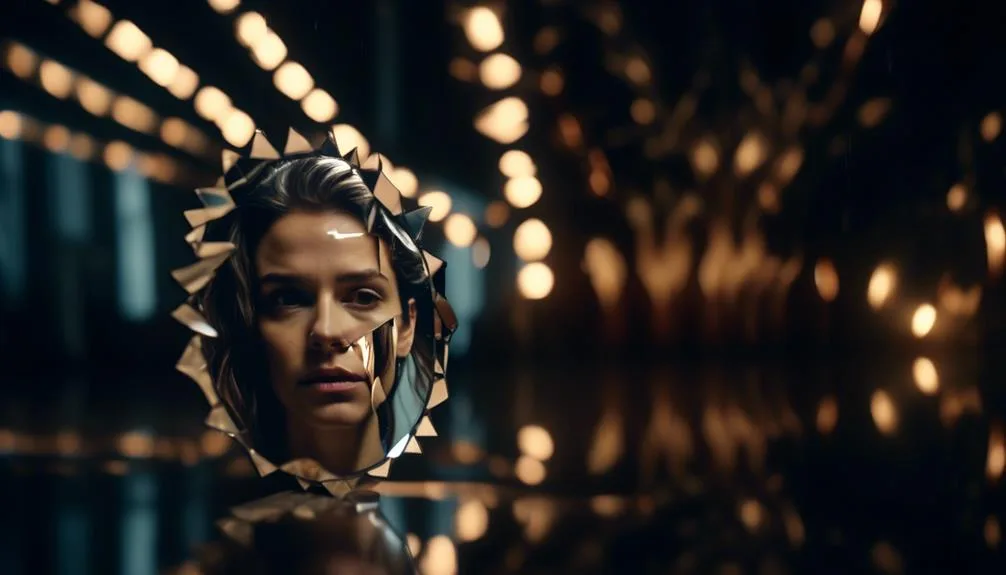
Delving into the world of cinema, we find that films depicting Dissociative Identity Disorder offer a powerful lens through which to explore the complexities of this mental health condition.
Exploring comedic portrayals, such as in 'Me, Myself & Irene,' you're given a glimpse into the lighter side of a condition typically shrouded in darkness.
However, these depictions also underscore the impact on relationships and family dynamics, often highlighting the strain and confusion that come with multiple identities.
Fight Club's Psychological Layers
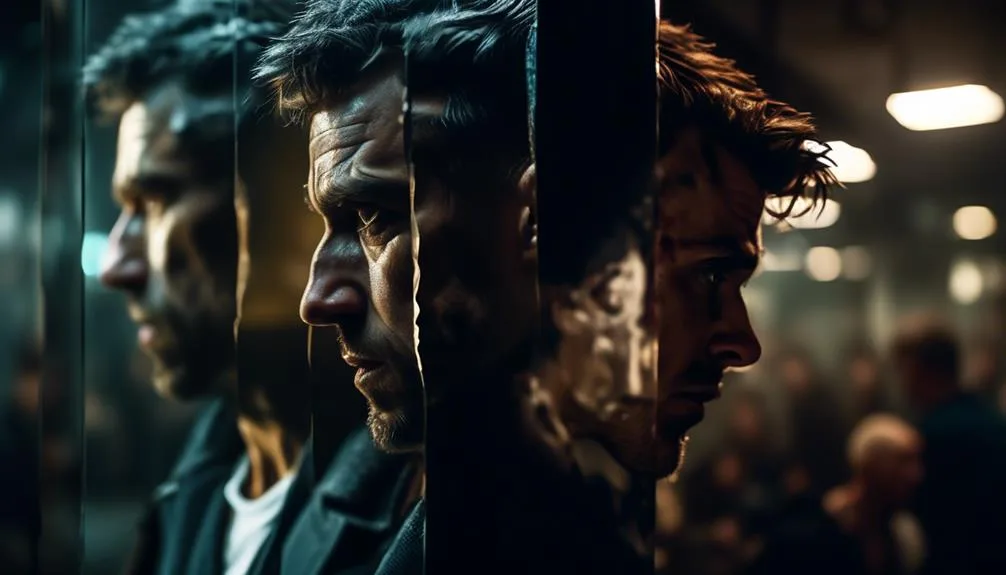
Peeling back the layers of 'Fight Club,' we uncover a rich psychological landscape that deftly explores the intricacies of dissociative identity disorder through its complex protagonist. The film reveals how this condition can violently disrupt one's life, shedding light on the impact on relationships when an individual's sense of self is fragmented.
As you watch, you'll see the protagonist's struggle with identity bleed into his interactions, creating chaos in the personal bonds he forms. 'Fight Club' doesn't depict the role of therapy conventionally; instead, it shows an unorthodox path to self-discovery, one that's raw and unfiltered.
The film invites you to empathize with the protagonist's turmoil, all while presenting a stark commentary on the necessity of addressing mental health issues with sincerity and support.
Hereditary's Ancestral Echoes
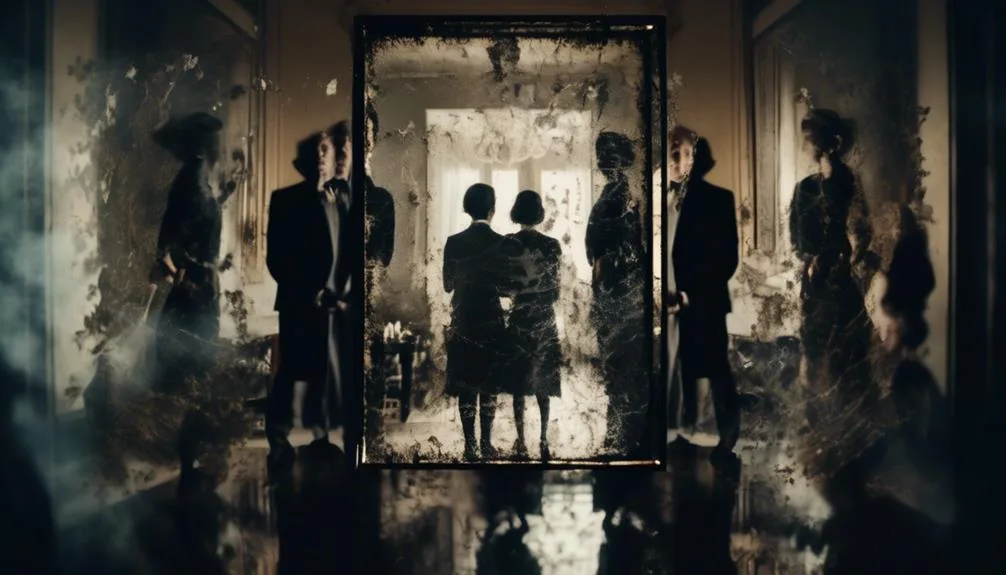
While 'Fight Club' confronts the chaos of dissociative identity disorder within the individual, 'Hereditary' takes a step further by examining how the shadows of our ancestry can shape and even shatter our present identities.
Ari Aster's film delves deep into ancestral trauma, where family secrets aren't merely skeletons in the closet but active forces that haunt the living. The movie suggests that what's inherited goes beyond physical traits; psychological scars and unresolved turmoil can ripple through generations.
You witness the harrowing unraveling of a lineage cursed by its past, compelling you to consider the weight of inheritance in shaping the psyche. 'Hereditary' doesn't just entertain; it serves as a stark reminder of the legacy of family trauma.
Split: Identity and Captivity
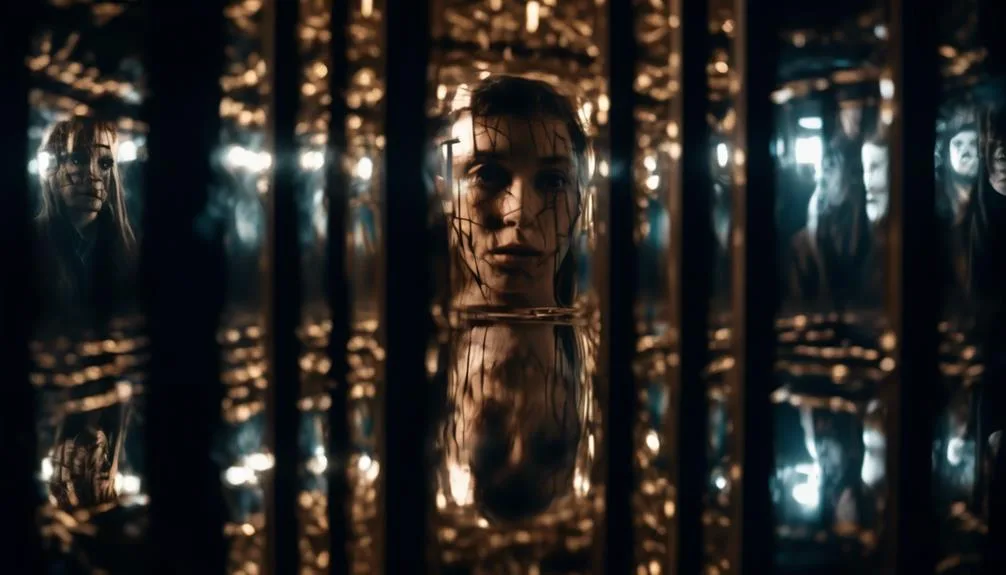
In 'Split,' M. Night Shyamalan captures the harrowing journey of an individual held captive not only by physical restraints but also by the myriad personas wrestling for control within his own mind. You watch, perhaps with a mix of horror and fascination, as Split's psychological exploration delves into the fragmented psyche of Kevin Wendell Crumb, portrayed with chilling precision by James McAvoy.
The film doesn't just entertain; it prompts you to ponder the impact of trauma on identity. Each of Kevin's distinct identities represents a facet of his response to past abuses, making you realize that captivity can be both a literal and a psychological construct.
'Split' challenges you to empathize with the internal chaos endured by those living with Dissociative Identity Disorder.
Sybil's True Complexity
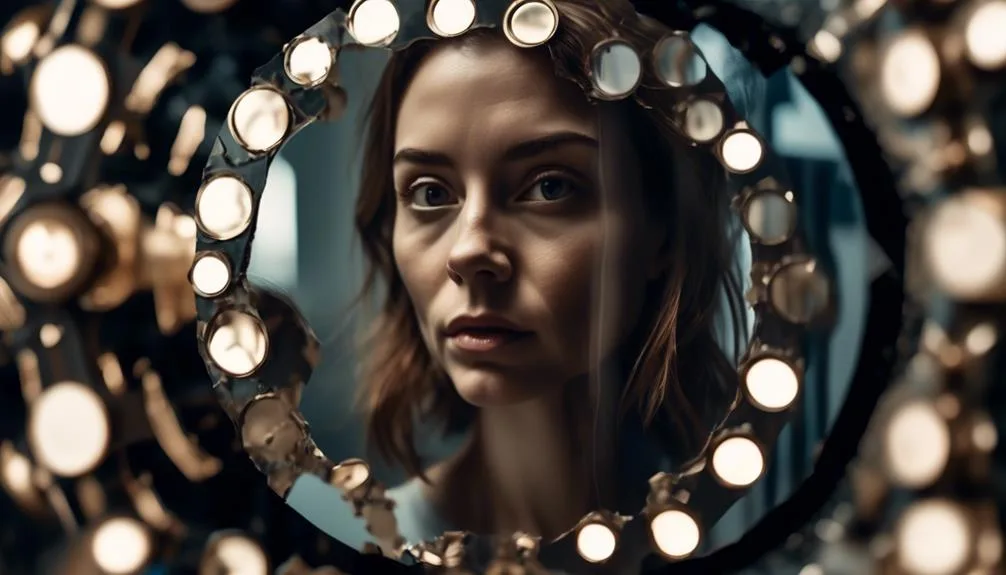
Reflecting on 'Split's portrayal of internal struggle, 'Sybil' presents an even deeper exploration into the multifaceted human psyche through the life of a woman living with sixteen distinct personalities. Here's what you need to understand about Sybil's true complexity:
- Sybil's impact: The film sparked conversations and increased public awareness about Dissociative Identity Disorder (DID), showcasing the profound effects on individuals' lives.
- Multilayered storytelling: 'Sybil' delves into the character's traumatic past to illuminate the psychological roots of her condition, providing a compassionate perspective.
- Dissociative identity disorder treatment: It underscores the importance of specialized therapy in managing DID, highlighting the long, yet hopeful journey toward integration and healing.
As you watch 'Sybil', you'll gain not just insight but also empathy for those grappling with this deeply misunderstood condition.
Addressing Disorder Seriousness
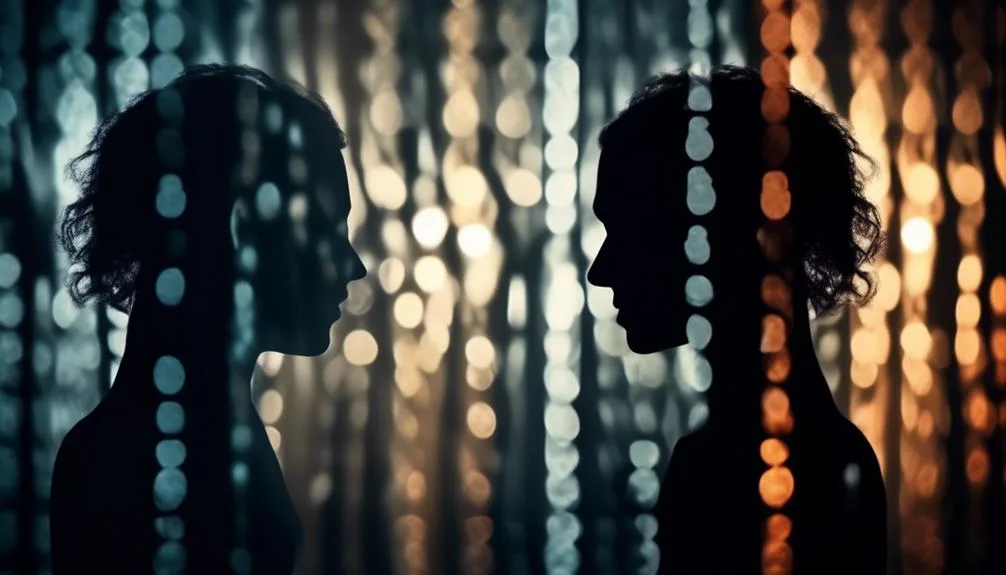
Dissociative Identity Disorder (DID) presents an immense challenge for those diagnosed, requiring professional intervention to navigate the complexities of the condition. Exploring treatment options is crucial, as therapy can significantly improve quality of life. The impact on relationships can be profound, often leading to misunderstandings and strain. Below is a table to give you insight into DID's implications:
| Aspect | Consideration |
|---|---|
| Therapy | Essential for integration and coping strategies |
| Medication | May alleviate associated symptoms |
| Support Systems | Vital for emotional stability |
| Public Perception | Often misunderstood due to media portrayal |
| Daily Functioning | Highly variable, depends on treatment progress |
Understanding DID through an empathetic lens is key. It's not just a plot twist in films; it's a real, oft-misunderstood struggle.
Frequently Asked Questions
How Do the Films Listed Above Handle the Portrayal of Treatment and Therapy for Dissociative Identity Disorder, and What Are the Ethical Implications of These Portrayals?
You're assessing how movies depict therapy for DID, considering cinematic ethics and viewer impact. Ethically, some portrayals may misinform, yet they also offer empathetic insights, influencing how you perceive and understand the disorder's treatment.
In What Ways Do These Movies Address the Potential Triggers and Consequences of Trauma That Often Lead to the Development of Dissociative Identity Disorder?
You'll find movies use symbolism to craft trauma representation, often taking cinematic license. They analyze triggers and consequences, offering an empathetic, yet analytical glimpse into the complex genesis of dissociative identity disorder.
You'll notice characters with dissociative identity disorder often struggle for integration while grappling with social stigma, reflecting society's limited grasp on the disorder's complexity and the empathy needed for genuine understanding.
What Role Does the Concept of the "Protector" or "Persecutor" Personality Play in These Movies, and How Does It Align or Differ From the Clinical Understanding of These Terms in Dissociative Identity Disorder?
In these movies, 'protector' personalities often emerge dramatically, differing from clinical subtleties. Cinematic liberties exaggerate personality dynamics, yet they echo real struggles, fostering empathy and deeper understanding of Dissociative Identity Disorder.
Are There Any Films That Have Been Criticized for Inaccurately Representing Dissociative Identity Disorder, and What Impact Do Such Representations Have on the Public Perception of the Disorder?
You've noticed films sometimes misrepresent Dissociative Identity Disorder, impacting public perception. Media responsibility is crucial for accurate public education, fostering empathy rather than perpetuating myths about such complex mental health conditions.
Conclusion
As the curtain falls, you're left pondering the fragmented mirrors of the self revealed through these films. They've taken you on a roller coaster of empathy and understanding, peeling back layers of the human psyche with a deft touch.
Remember, behind the dramatic portrayals, real souls navigate the tempestuous seas of DID. Let's carry this newfound awareness beyond the theater's shadows, nurturing compassion for those wrestling with the complex tapestry of their own minds.

